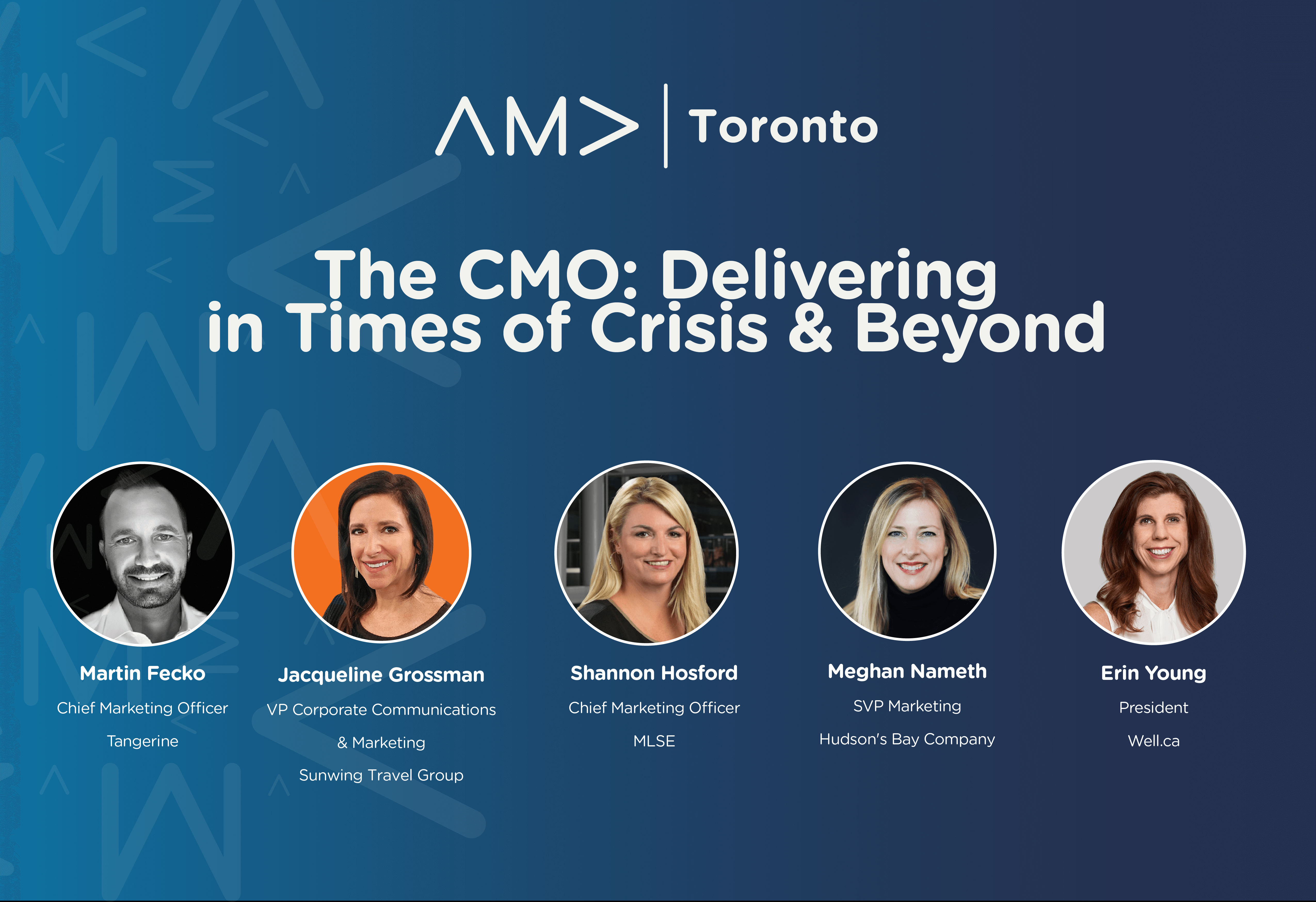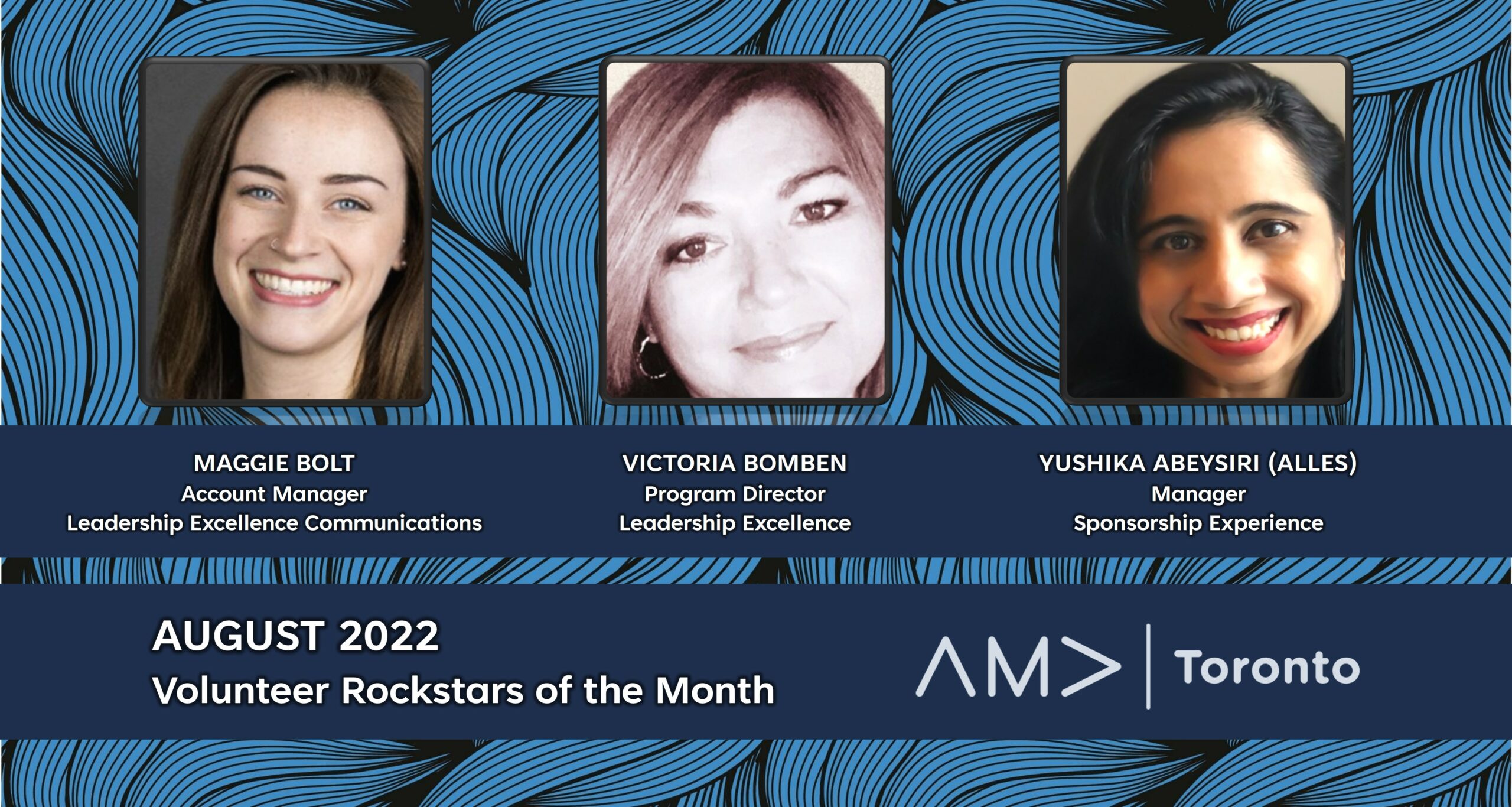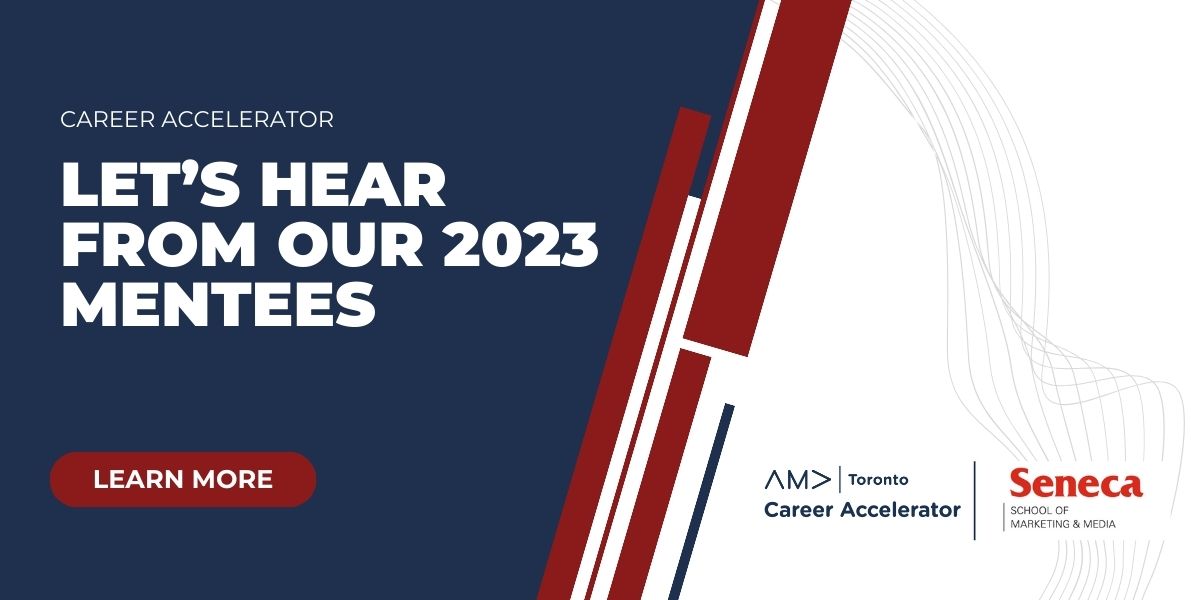Amid uncertainty, CMOs reset and reimagine the future
The annual CMO event has been a highlight of the AMA Toronto’s programming for several years, and it’s typically been framed by research from the bi-annual CMO Survey, conducted each year in February and August. This year, of course, has been very different: the emergence of the COVID-19 pandemic in mid-March meant that February’s survey results were redundant, and rather than an in-person meeting over breakfast, the CMO panel met online to discuss their different experiences with the pandemic.
This year’s CMO panellists were Martin Fecko (Chief Marketing Officer, Tangerine), Jacqueline Grossman (VP Corporate Communications and Marketing, Sunwing Travel Group), Shannon Hosford (Chief Marketing Officer, MLSE), Meghan Nameth (SVP Marketing, Hudson’s Bay Company), and Erin Young (President, Well.ca). They were joined by host and moderator, AMA board member Craig Lund, and by event sponsor Mo Dezyanian (President, Empathy Inc.).
Not all are equal: the uneven impact of COVID-19
After some initial technical challenges – as one of the panellists commented, it’s clear that Zoom meetings are not always seamless! – Craig began the discussion by asking the experts to describe how COVID-19 had affected their business, whether it had disrupted operations, and the impact it had had on revenues.
Martin from Tangerine began the discussion, noting that as a digital bank, Tangerine’s objective has always been to help Canadians save more, and that the pandemic has expedited digital adoption, not just for people, but for organizations as well. Martin also spoke about Tangerine’s efforts to streamline and digitize workflows: even a digital bank still had processes that required face-to-face interactions.
Meghan from Hudson’s Bay Company spoke about efforts to keep their online business running while also keeping employees safe, and about the need to connect with customers to offer the products that they needed most. Meghan also described HBC’s efforts to help vulnerable Canadians, and noted that beyond HBC’s initial $1M donation, Canadians had donated an additional $750K to provide support back to their own communities.
Erin from Well.ca noted that as an online-only health and wellness brand, they were in the right place at the right time. They quickly experienced Black-Friday-like volumes, but without the fun. Orders and customers were growing so quickly that Well.ca decided to limit the number of daily orders they could process, and they found that most customers heeded the call to shop responsibly.
Jacqueline from Sunwing started by commenting that she will always remember where she was when COVID hit, as the company shifted rapidly from making Canadians’ vacation dreams come true to having to rapidly repatriate 60,000 passengers before the borders closed. Much of Sunwing’s staff is currently laid off, including all the pilots and crews, most of the head office staff, and most of the marketing department.
Shannon from MLSE began by remembering that almost exactly a year ago, Toronto was celebrating the Raptors’ historic NBA championship, but that after March 12, when all of MLSE’s operations were suspended, the arena experience will likely never be the same again. Shannon also noted, however, that MLSE is a resilient operation: they’ve prioritized keeping their people employed, engaged, and safe; they’re already working on opportunities for partner involvement; and they’ve worked hard to give back to the community, notably by opening massive kitchens at Scotiabank Arena and BMO Field to provide nearly half a million meals for front-line workers.
Current challenges lead to ongoing uncertainty
Next, Craig asked the panellists to predict how long the current challenges might last. The responses were similar, with the experts agreeing that recovery is going to take a long time. Erin stated that she felt it would take at least 18 months, possibly longer, and that consumer demand is going to change, shifting towards value. Martin agreed, adding that consumer spending patterns had changed, and that it was a good sign that customers were still spending within their means.
Shannon echoed the sentiment that it would be hard to predict when things would be back to normal. And finally, while Jacqueline noted that the travel industry will never be the same, and that a full recovery is still a long way away, she also emphasized that this is an opportunity to pause and hit the reset button.
Building connections, being agile, and doing more with less
Craig then shifted focus, asking the CMOs to talk about how the pandemic has changed their roles. Meghan emphasized that HBC felt their top responsibilities were maintaining their employee base and responding to the community, and that staying connected to consumer needs was essential. Meghan also pointed out that as a CMO, this was an opportunity to rise to the occasion and prove that they could do more with less.
Next, Jacqueline spoke about the need to be agile to survive as a marketer in the travel industry, and explained that during this crisis, marketing’s role shifted from advertiser to brand custodian. They’ve also looked towards consumer insights and sentiments to ensure that their marketing strategy will be successful and responsive during the recovery.
Besides noting that marketing has shifted away from customer acquisition and towards brand building and supporting customers, Erin also pointed out that the COVID-19 crisis has resulted in at least one positive change: better connections and stronger lines of communication between marketing and the rest of the business.
The impact on the CMO-CFO relationship
Event sponsor Mo from Empathy Inc. sparked a brief but interesting discussion about how the crisis had affected dialogue with the CFO. The responses were generally positive: Meghan noted that they’ve worked hard to manage both expenses and cash flow; Jacqueline emphasized that they’re working hard to ensure that customers remember them as an empathetic and compassionate brand, as that will be critical to ensuring that people continue to view the brand in a positive light; and Martin spoke about the value of teamwork and the need for the CMO and CFO to work collectively rather than independently.
Breakout session insights
In one group, AMA board member Matt Chong led an interesting discussion with participants about the ideas discussed so far. Certain trends seem universal: even when things start to get back to normal, many people will still be working more from home, and automation is going to increase. Matt then opened a discussion with Shannon about how the pandemic had affected marketing plans. Shannon said that the biggest change was that they would be focusing on communicating to fans and stakeholders about how they could come back to events safely. MLSE has also had to pivot overnight towards digital rather than live content, which has given their event-based staff a chance to show their talents and has highlighted the value of people who can wear two hats, especially “preditors” – those with talent in both production and editing. Finally, Shannon stated that her organization has prioritized keeping staff employed and making sure that they have valuable and meaningful work.
As participants gathered to conclude the event, Craig asked the CMOs to summarize the ideas that resonated in their sessions as we start looking towards the future.
Erin reflected upon the pace of change, the importance of agility, and stated that strong brands stand for something and give back.
Martin emphasized the value in getting different perspectives from forums like this one, especially when dollars are tight, and marketers need to demonstrate value and ROI.
Shannon asked participants to consider how brands and CMOs react in a crisis and reminded them that consumers will remember how brands acted during this time.
Meghan spoke about reinvention and noted that the crisis gave brands an opportunity to move away from legacy programs, creating an exciting blank slate for reinventing marketing and brand programs.
Finally, Jacqueline emphasized that despite the bleak outlook, the crisis also offers an amazing opportunity to reset and reimagine what travel will look like, assuring the audience that they will emerge as a more agile and authentic brand.
While each of these companies have been disrupted in different ways in recent months, their CMOs have demonstrated clearly that vision and insight are key elements for a successful future. The talent, compassion, and leadership they showed us in this session leave little doubt that under their guidance, the challenges their organizations face today will become opportunities tomorrow.
This article was brought to you through the partnership between the AMA Toronto and HeadStart Copywriting.




